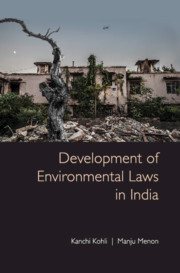Book contents
- Frontmatter
- Contents
- List of Tables
- Preface
- Acknowledgements
- Introduction: Environmental Laws and Development in India
- 1 Fundamentals of Environmental Law
- 2 Institutions Regulating India’s Environment
- 3 Forest Reservation and Conservation
- 4 Pollution Control and Prevention
- 5 Environmental Protection
- 6 Wildlife and Biodiversity Conservation
- 7 Ground and Surface Water Extraction
- 8 Land Acquisition
- 9 Climate Litigation and Policy Frameworks
- 10 Contemporary Environmental Law Reforms
- Index of Laws, Legal Cases and Government and Parliamentary Committee Reports
- General Index
Introduction: Environmental Laws and Development in India
Published online by Cambridge University Press: 31 July 2021
- Frontmatter
- Contents
- List of Tables
- Preface
- Acknowledgements
- Introduction: Environmental Laws and Development in India
- 1 Fundamentals of Environmental Law
- 2 Institutions Regulating India’s Environment
- 3 Forest Reservation and Conservation
- 4 Pollution Control and Prevention
- 5 Environmental Protection
- 6 Wildlife and Biodiversity Conservation
- 7 Ground and Surface Water Extraction
- 8 Land Acquisition
- 9 Climate Litigation and Policy Frameworks
- 10 Contemporary Environmental Law Reforms
- Index of Laws, Legal Cases and Government and Parliamentary Committee Reports
- General Index
Summary
Environmental laws are largely understood as a body of legal codes, statutes, case law, regulations and principles that are used to mediate the relationship between humans and nature. In India, environmental laws govern the protection, management and distribution of natural resources between what are framed as competing realms, such as between the economic and the sociocultural, between ecological needs and livelihood requirements, between the human and non-human and between present and future uses. Indian environmental laws are framed with competition and conflict at their core. Most times, the protective, managerial and distributive aspects of environmental laws are treated as technical matters to be decided based on costs and benefits. The laws fail, for most part, to note that nature is the material basis for the survival and well-being of all.
This volume unpacks environmental laws in India and outlines their development. It tries to understand the development of environmental laws in India by locating them within broader local, national and international sociopolitical and economic influences. More specifically, it seeks to establish the relationships between the last five decades of environmental law-making and practice in India and the institutional ideologies of developmentalism that have held sway during this period. This volume shows that the shifts in the political economy of the Indian state are reflected or even supported by the development of Indian environmental laws.
This book explores that the development and practice of environmental law in India can be understood as a domain of power through which actions of individuals and societies are controlled towards certain ends which are contingent, multiple and fluid. This field of power is dominated by four major actors who have exerted tremendous influence on Indian society through the exercise of environmental laws. These are the governments, courts, international environmental institutions and expert-based domestic regulatory institutions. The control exerted by these institutionalised actors is possible to trace as it is done through the use of statutes and governmental notifications, case law, legal principles and well-documented decisions—all of which are part of Indian environmental law. The chapters in this volume map the development and use of these legal instruments to regulate different kinds of environmental use.
- Type
- Chapter
- Information
- Development of Environmental Laws in India , pp. 1 - 29Publisher: Cambridge University PressPrint publication year: 2021



